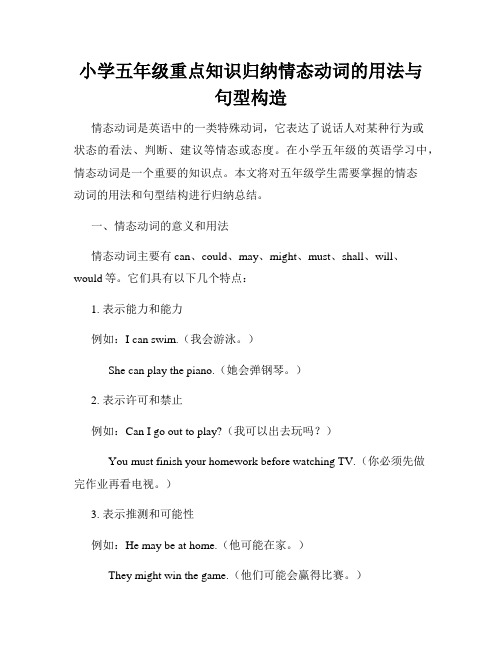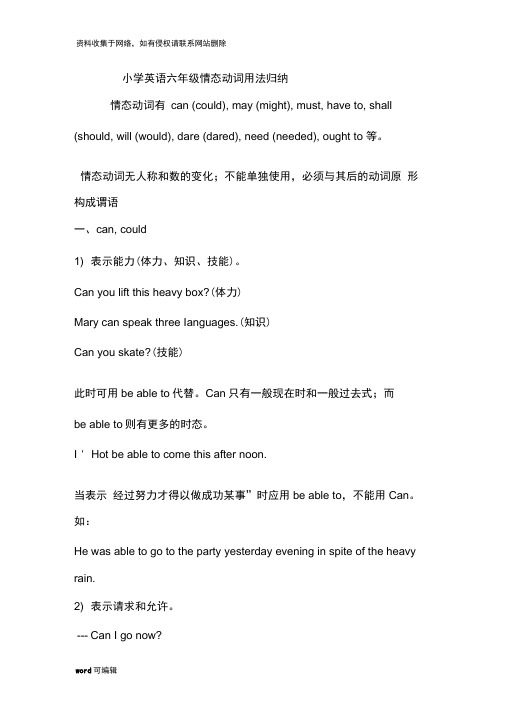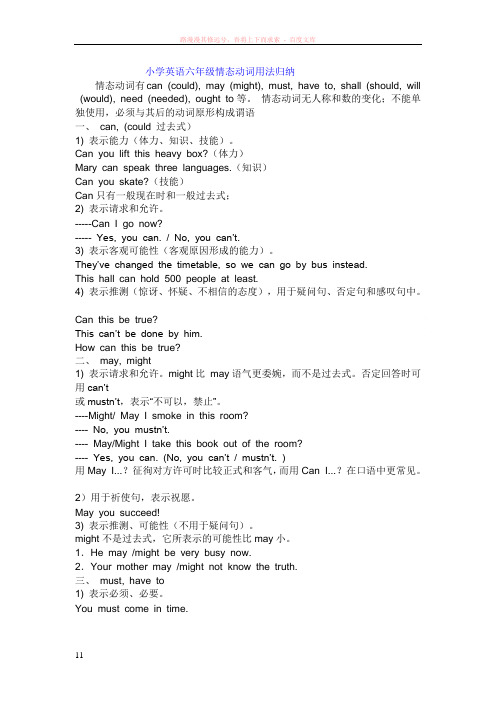小学情态动词总复习
情态动词复习要点

情态动词复习要点一、can/could和may/might表示“许可”1. 两者都可以表示许可,常可互换。
如:Can(May)I borrow your knife?我可以借你的刀子吗?The teacher says we can(may)leave early tomorrow. 老师说我们明天可以早一点走。
2.表示请求许可时,用could/might 比用can/ might更委婉。
但肯定回答时要用can或may。
---Could(Might)I stay in your office? 我可以呆在你的办公室吗?--- Of course, you can(may). 当然可以。
3. 表示“禁止,不允许”时用must not(mustn’t)。
You mustn’t climb the tree. It’s dangerous. 你不能爬树,那危险。
二、can, could和be able to表示“能力”1. 在现在时中can, be able to可互换。
如:I can(am able to) write some English words now. 我现在会写一些英语单词了。
2. be able to还可用于将来时和完成时。
如:He will be able to see you tomorrow.他明天去拜访你。
I have been able to go to work for a week. 我已经上班一周了。
3. 在过去时中,could表示泛指的能力,was/were able to表示过去特定的某一次能力。
如:She could swim when she was ten. 她十岁时就会游泳了。
Only thirty people in the building were able to escape after the fire broke out. 大火爆发后只有三十人从大楼里逃了出来。
(完整)小学情态动词总复习

8、May I sit here?----- Yes, please.\Sorry, please don’t.9、May I have some Coke?---- Yes, of course.10、May/ Could / Can I speak to Tom? -----Speaking. Who’s calling?11、should 、shouldn’t 表示劝告:1) He should get up early.2) She shouldn’t play computer game too much.12、Should +主语+动词原形? Yes, ~should.\ No, ~shouldn’t.13、表示建议“你愿意…吗”Would you like to go shopping with me?-----Yes, I’d love to. /I’d love to. But I’m busy now.14、就餐用语Would you like something to eat\drink? ----Yes, I’d like…15、shall用于第一人称(I, we), 可以表示“将”和表示建议“……好吗?”1) Where shall we have dinner?2) Shall we go fishing? -----All right. \OK. \Good idea.16、Must + 主语+ 动词原形? ---Yes,~must.\No, ~needn’t.情态动词练习一.按照要求改写句子1. I can run fast.I ________ ________ fast. (否定句)2. You must return the book now.(一般疑问句)________ I return the book now? No, you ________.3. He can play basketball well. (一般疑问句)_______ he ______ basketball well?4. They must take the books out of the room. (否定句)They ________ ________ the books out of the room.5. He should get up early. (否定句)He _______ get up late.6. Daniel must watch TV every evening.(改为否定句)___________________________________________________7. I can’t do my homework every day.(改为肯定句)________________________________________________________。
小学五年级重点知识归纳情态动词的用法与句型构造

小学五年级重点知识归纳情态动词的用法与句型构造情态动词是英语中的一类特殊动词,它表达了说话人对某种行为或状态的看法、判断、建议等情态或态度。
在小学五年级的英语学习中,情态动词是一个重要的知识点。
本文将对五年级学生需要掌握的情态动词的用法和句型结构进行归纳总结。
一、情态动词的意义和用法情态动词主要有can、could、may、might、must、shall、will、would等。
它们具有以下几个特点:1. 表示能力和能力例如:I can swim.(我会游泳。
)She can play the piano.(她会弹钢琴。
)2. 表示许可和禁止例如:Can I go out to play?(我可以出去玩吗?)You must finish your homework before watching TV.(你必须先做完作业再看电视。
)3. 表示推测和可能性例如:He may be at home.(他可能在家。
)They might win the game.(他们可能会赢得比赛。
)4. 表示意愿和请求例如:I will help you.(我会帮助你。
)Could you pass me the pen, please?(请你给我递一支笔,好吗?)二、情态动词的句型构造1. 肯定句情态动词后面直接跟动词原形。
例如:He can swim.(他会游泳。
)They will come tomorrow.(他们明天会来。
)2. 否定句在情态动词后面加not。
例如:I cannot play basketball.(我不能打篮球。
)She will not go to the party.(她不会参加聚会。
)3. 疑问句将情态动词放在句子的开头。
例如:Can you help me?(你能帮助我吗?)Will she come to the concert?(她会来听音乐会吗?)4. 一般疑问句回答主语+情态动词。
小升初英语总复习情态动词

小升初英语情态动词概述情态动词概述特征1)情态动词(modal verb)本身有词义,表示说话人的语气或情态,但词义不完全,不能单独用作谓语动词,一般只能和动词原形一起构成谓语动词。
2)情态动词所表示的情态有:命令、允诺、请求、拒绝、愿望、愿意、义务、必要、可能、能力、敢于、需要等。
3)情态动词(ought除外)和助动词shall,will,should,would一样,后面的动词不定式一般皆不带。
形式变化1)没有人称和数的变化,第三人称单数的现在时也无变化。
如:I can We canYou can You canHeThey canShe canIt2)有些情态动词有过去式,有少数过去式和它的原形相同。
a)有过去式的情态动词有:may -- wouldcan ―― couldmay―― nightshall -- shouldhave to -- had tob)过去式不变的情态动词有:must - must (或had to)ought to - ought toneed---needdare - dare(亦可用dared)3)大多数情态动词后面可用动词的进行式、完成式和被动形式,如:can(may,must)be doing,can(may,must) have done,can(may,must)be done等。
否定式情态动词和助动词一样,后面可直接跟否定词not。
现将情态动词的否定式及其否定式的简略式(简略式用于口语中)列举如下:shall not--shan't [FB:nt]will not---won't [wEunt]can not-can't [kB:nt]must not-mustn't [5mQsnt]should not-- shouldn'twould not-- wouldn'tcould not-- couldn'tdare not- daren't [dZEnt]need not-- needn't在疑问句中的用法情态动词在疑问句中的用法和助动词相同。
小学英语六年级情态动词用法归纳讲解学习

小学英语六年级情态动词用法归纳情态动词有can (could), may (might), must, have to, shall (should, will (would), dare (dared), need (needed), ought to 等。
情态动词无人称和数的变化;不能单独使用,必须与其后的动词原形构成谓语一、can, could1) 表示能力(体力、知识、技能)。
Can you lift this heavy box?(体力)Mary can speak three Ianguages.(知识)Can you skate?(技能)此时可用be able to代替。
Can只有一般现在时和一般过去式;而be able to则有更多的时态。
I ' Hot be able to come this after noon.当表示经过努力才得以做成功某事”时应用be able to,不能用Can。
如:He was able to go to the party yesterday evening in spite of the heavy rain.2) 表示请求和允许。
--- Can I go now?——Yes, you can. / No, you can' t.此时可与may互换。
在疑问句中还可用could,might代替,不是过去式,只是语气更委婉,不能用于肯定句和答语中。
——Could I come to see you tomorrow?----Yes, you can. ( No, I ' mfraid not.)3)表示客观可能性(客观原因形成的能力)。
They' vecha nged the timetable, so we can go by bus in stead.This hall can hold 500 people at least.4)表示推测(惊讶、怀疑、不相信的态度),用于疑问句、否定句和感叹句中。
小学英语六年级情态动词用法归纳

小学英语六年级情态动词用法归纳情态动词有can (could), may (might), must, have to, shall (should, will (would), need (needed), ought to等。
情态动词无人称和数的变化;不能单独使用,必须与其后的动词原形构成谓语一、can, (could 过去式)1) 表示能力(体力、知识、技能)。
Can you lift this heavy box?(体力)Mary can speak three languages.(知识)Can you skate?(技能)Can只有一般现在时和一般过去式;2) 表示请求和允许。
-----Can I go now?----- Yes, you can. / No, you can’t.3) 表示客观可能性(客观原因形成的能力)。
They’ve changed the timetable, so we can go by bus instead.This hall can hold 500 people at least.4) 表示推测(惊讶、怀疑、不相信的态度),用于疑问句、否定句和感叹句中。
Can this be true?This can’t be done by him.How can this be true?二、may, might1) 表示请求和允许。
might比may语气更委婉,而不是过去式。
否定回答时可用can’t或mustn’t,表示“不可以,禁止”。
----Might/ May I smoke in this room?---- No, you mustn’t.---- May/Might I take this book out of the room?---- Yes, you can. (No, you can’t / mustn’t. )用May I...?征徇对方许可时比较正式和客气,而用Can I...?在口语中更常见。
小学语法经典总结---情态动词的考点
小学语法经典总结---情态动词的考点
1. 什么是情态动词?
情态动词是指用来表示说话人对某种行为或状态的看法、愿望、能力、推测等情态的一类动词。
常见的情态动词有:能、可以、会、应该、应当、要、需要、愿意、会、可能、可能要等。
2. 情态动词的功能
- 表示能力:表示某种行为或状态是能力所及的,如:can、could。
- 表示许可:表示某种行为是被允许的,如:may、might。
- 表示必须:表示某种行为是必须的,如:must、have to。
- 表示推测:表示对某种行为或状态的推测,如:may、might、could、must等。
3. 情态动词的使用注意事项
- 与动词原形搭配:不管什么时态下,情态动词后的动词都是用原形,如:I can swim.(我会游泳。
)
- 不能用于进行时态:情态动词本身没有进行时态的形式,因此不能和进行时态连用,如:She can playing soccer.(错误)- 情态动词表示过去的情态动作使用
"have/has/could/might/would + have + 过去分词"的形式。
4. 情态动词的考点
- 能力:can、could。
如:She can play the piano.(她会弹钢琴。
)
- 许可:may、can。
如:May I go to the bathroom?(我可以去洗手间吗?)
- 命令:must、have to。
如:You must do your homework.(你必须做作业。
)
以上是小学语法经典总结中关于情态动词的考点内容。
小学英语常考情态动词及习题练习
小学常考情态动词(can,must,should,might)及习题情态动词:情态动词本身具有一定的词义,表示说话人的某种语气或感情,但不能单独作谓语,通常要和行为动词一起构成谓语。
情态动词没有人称和数的变化,适用于所有人称,其后要接动词原形。
一、情态动词can的用法:1、其中情态动词can表能力时意为“能够做某事”,后接动词原形;否定形式为can't或cannot;can的过去式为could。
例:1.Tony can play basketball, but he can't play the piano.Tony会打篮球,但他不会弹钢琴。
2.Can Lily speak Chinese? —Lily会说中文吗?-Yes, she can. —是的,她会。
3.What can you do, Kate? —Kate,你会做什么?-I can play the violin. —我会拉小提琴。
2、其中情态动词can表许可或请求别人的许可时,意为“可以”,后接动词原形,相当于may,但may多用于正式、庄重的场合;can的否定形式为can't 或cannot。
例:You can go now if you like. 如果你想走,现在就可以走了。
-Mark, can I use your pen? —Mark,我能用下你的钢笔吗?-Of course. —当然了。
二、情态动词must表示“必须,应该,一定要”。
●∙主语是第一人称I或we时,表示说话人认为有必要或者有义务做某事;主语是第二、第三人称you、they、he、she等时,表示说话人要求或命令别人做某事。
●∙must的否定形式为must not,缩写为mustn't,意为“不许;严禁”。
●∙must引导的一般疑问句,肯定回答用must,否定回答用needn't或don'thave to,意为“不必”。
小学情态动词用法总结
小学情态动词用法总结在小学英语的学习中,情态动词是一个重要的语法点。
情态动词虽然数量不多,但用法多样,对于小学生来说,掌握它们的用法有一定的难度。
下面,我们就来详细总结一下小学阶段常见的情态动词及其用法。
一、常见的小学情态动词1、 can“can”表示“能;会”,是最常见和基础的情态动词之一。
例如:“I can swim”(我会游泳。
)“She can dance”(她会跳舞。
)2、 could“could”是“can”的过去式,常用于过去时态中。
但它也可以用于比较委婉、客气的请求或建议。
比如:“Could you help me?”(你能帮我吗?)3、 may“may”表示“可能;也许;可以”。
例如:“It may rain tomorrow”(明天可能会下雨。
)“May I come in?”(我可以进来吗?)4、 might“might”是“may”的过去式,语气比“may”更加委婉、不确定。
比如:“He might be at home”(他也许在家。
)5、 must“must”表示“必须;一定”,语气比较强烈。
例如:“You must finish your homework”(你必须完成作业。
)6、 should“should”表示“应该;应当”,常用来给出建议或表达义务。
比如:“You should brush your teeth twice a day”(你应该每天刷两次牙。
)7、 shall“shall”在小学阶段用得相对较少,通常用于第一人称,表示征求意见或提出建议。
例如:“Shall we go to the park?”(我们去公园好吗?)二、情态动词的特点1、后接动词原形无论主语是什么,情态动词后面都要接动词原形。
例如:“He can play football”“They should study hard”2、没有人称和数的变化也就是说,不管主语是单数还是复数,第一人称、第二人称还是第三人称,情态动词的形式都不会改变。
情态动词知识点(最新整理)
情态动词本身有一定的词义,但是不能独立作谓语,只能和行为动词一起构成谓语。
情态动词用在行为动词前,表示说话人对这一动作或状态的看法或主观设想。
情态动词虽然数量不多,但用途广泛,主要有下列:can (could), may (might), must, need, ought to, dare (dared), shall (should), will (would) .①只做情态动词:must,can,may……②可做情态动词又可做实义动词:如:need,will,dare③具有情态动词特征:have(had,has) to,used to,ought to④可做情态动词又可作助动词:如:shall(should),will(would)注:mustn't代表强烈禁止must表示主观,have to表示客观。
常用的有:can (could), may (might), must, need, ought to, dare (dared), shall (should), will (would)位置:1- 具有助动词作用,可以用来构成否定句,疑问句及用于简单回答。
Can you sing an English song?你会唱英语歌吗?Yes I can.是的,我会。
2-后接动词原形,即不带to的不定式。
She may lose her way.她可能迷路了。
3-无人称和数的变化。
We must stay here.我们必须待在这儿。
He must stay here.他必须待在这儿。
4-有一定的词义,但并不完整,必须与动词原形一起构成谓语。
(后面加动词原形)5-在以Could引导的表示委婉语气的疑问句,常用来表示请求别人帮助或对长辈的请求的。
如:(Could you come to my party on Saturday afternoon?)注意:这里不是情态动词的用法。
回答为:肯定:Yes,I can./Sure./Certainly. 否定:Sorry,I am afraid not.(在作否定回答时,要注意:在拒绝长辈的请求时,不能用can not,这样显得语气太过生硬,不礼貌。
- 1、下载文档前请自行甄别文档内容的完整性,平台不提供额外的编辑、内容补充、找答案等附加服务。
- 2、"仅部分预览"的文档,不可在线预览部分如存在完整性等问题,可反馈申请退款(可完整预览的文档不适用该条件!)。
- 3、如文档侵犯您的权益,请联系客服反馈,我们会尽快为您处理(人工客服工作时间:9:00-18:30)。
小学情态动词总复习 -CAL-FENGHAI-(2020YEAR-YICAI)_JINGBIAN情态动词一、情态动词的定义:情态动词有词义,但它不能单独作谓语,它必须和其他动词一起构成谓语。
情态动词没有人称和数的变化;它的后面必须跟动词原形。
三.用法特点⑴它们必须与其他动词连用,即:肯定:情态动词+动词原形:He can swim.否定:情态动词+not+动词原形:He can not(can’t)swim.一般疑问句:把情态动词提前:Can he swim?Yes,he can./No,he can’t.表示说话人对所述动作的看法,如需要、可能、意愿或怀疑等。
⑵情态动词没有人称和数的变化,即第三人称单数不加-s,有些情态动词有时态的变化⑶在意义上,情态动词具有“多义性”。
例:can既可表示能力,又可表示可能、允许等意义。
四、情态动词的用法及主要句型:1、Can I help you ——Yes, please. / No, thanks.2、Can + 主语 + 动词原形Yes, ~ can. No, ~can’t.3、Can I borrow(借用) your book----Yes,of course.4、Can I write on the book ------No, you can’t\mustn’t.5、Could \Can you help me---- Yes,of course.\Certainly.\ Sure.6、Could \Can you tell me the way to the zoo?7、May I come in ----- Come in, please.8、May I sit here----- Yes, please.\Sorry, please don’t.9、May I have some Coke---- Yes, of course.10、May/ Could / Can I speak to Tom -----Speaking. Who’s calling11、should 、shouldn’t 表示劝告:1) He should get up early.2) She shouldn’t play computer game too much.12、Should +主语 +动词原形 Yes, ~ should.\ No, ~shouldn’t.13、表示建议“你愿意…吗”Would you like to go shopping with me-----Yes, I’d love to. /I’d love to. But I’m busy now.14、就餐用语Would you like something to eat\drink ----Yes, I’d like…15、shall用于第一人称(I, we), 可以表示“将”和表示建议“……好吗”1) Where shall we have dinner?2) Shall we go fishing-----All right. \OK. \Good idea.16、Must + 主语 + 动词原形---Yes,~ must.\No, ~needn’t.情态动词练习一.按照要求改写句子1. I can run fast.I ________ ________ fast. (否定句)2. You must return the book now.(一般疑问句)________ I return the book nowNo, you ________.3. He can play basketball well. (一般疑问句)_______ he ______ basketball well?4. They must take the books out of the room. (否定句)They ________ ________ the books out of the room.5. He should get up early. (否定句)He _______ get up late.6. Daniel must watch TV every evening.(改为否定句)___________________________________________________7. I can’t do my homework every day.(改为肯定句)________________________________________________________8. You’ll need your book and pen..(改为否定句)_______________________________________________________9.We shall like playing computer games.(翻译句子)________________________________________________________10. She should go to school every morning.(改为否定句)_______________________________________________________11. He can speak English very well.(翻译句子)__________________________________________________________12. Would you like to drink coffee(肯定回答)________________________________________________________13. She can walk quickly. (否定句)14. They can paint the wall well. (一般疑问句)________________________________________________________15. Tom must carry the box into the room. (否定句)________________________________________________________16. She should reach the station early. (否定句)________________________________________________________二.单项选择。
()1. you like some milkA . Would B. Could C . Can()2. We pick the flower in the park. A. can’t B. don't C. mustn’t ( ) 3.We should more trees, and we shouldn’t cut any trees.A. plantB. plantingC. plants( ) 4.May I have some coffee?A.Yes,you have.B. Yes,you can.C. Yes,certainly.( ) 5.Shall we visit the factory?A.Yes,we do.B.Yes, we shall. B.All right.( ) 6.Would you like something to eat?A.Yes,we would.B.Yes, I’d like some cakes.C.Yes, of course.( ) 7.What can I do for you?A.Yes,you can.B.No,I can do it.C. Y es.I’d like some orange s.()8. you like some breadA . Would B. Could C . Can()9. We throw the waste in the zoo.A. aren’t`B. don'tC. mustn’tA.Yes,you have.B. Yes,you can.C. Yes,certainly.( ) 11.Would you like some teaA.Yes,thank you..B.Yes, please. B. No, here you are..( ) 12.Can I help you?A.Yes,you can.B.No,I can do it.C.Yes.I’d like some orange s. ( ) 13. May I your eraserA useB hasC using( ) 14. Can she high?A jumpsB jumpingC jump( ) 15. What should Amy for her mum?A buysB buyingC buy( ) 16. They may in the libtary.A readB readingC reads( ) 17. I would like shopping with you.A goingB to goC go( ) 18. What will Zhou LinA doB doingC does( ) 20. They must .A friendlyB are friendlyC be friendly。
